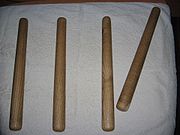
Ttakuna
Encyclopedia

Txalaparta
The txalaparta is a specialized Basque music device of wood or stone, similar to Romanian toacă. In Basque, zalaparta means "racket", while in the nearby areas of Navarre "txalaparta" has been attested as meaning the trot of the horse, a sense closely related to the sound of the...
with the sticks. It provides the grounds for the traditional txalaparta alongside the herrena
Herrena
Herrena is one of the parts performed by the traditional txalaparta players, the other one being the ttakuna; another lesser known traditional term for herrena is urguna. The herrena is opposed to the ttakuna in that it breaks the balance the latter intends to maintain...
within a binary pattern. In that instrument, played by two performers, each one takes on a part on the performance, either the ttakuna or the herrena. The ttakuna represents the balance or the regularity, meaning that this performer shall steadily play two even beats on the boards when it is their turn. However, the herrena may choose to play the ttakun too as they please.
These two beats are fairly even in the traditional txalaparta, with a slight stress on the first strike, but it's not uncommon listening to ttakunas being performed markedly tilted to the second beat (resulting in an emphasized second beat), driven by inertia
Inertia
Inertia is the resistance of any physical object to a change in its state of motion or rest, or the tendency of an object to resist any change in its motion. It is proportional to an object's mass. The principle of inertia is one of the fundamental principles of classical physics which are used to...
.
On the strength of the development the txalaparta
Txalaparta
The txalaparta is a specialized Basque music device of wood or stone, similar to Romanian toacă. In Basque, zalaparta means "racket", while in the nearby areas of Navarre "txalaparta" has been attested as meaning the trot of the horse, a sense closely related to the sound of the...
has gone through, these boundaries between the two parts played by each performer have gradually eased off, and the person playing ttakuna may break their part and alternate with other combinations (eg a single beat or a rest), so destabilizing the former balance and starting off a dialectical struggle between both players.

